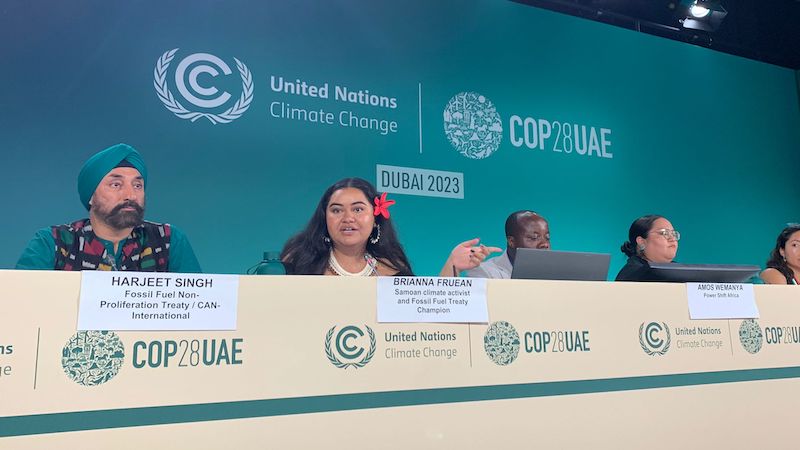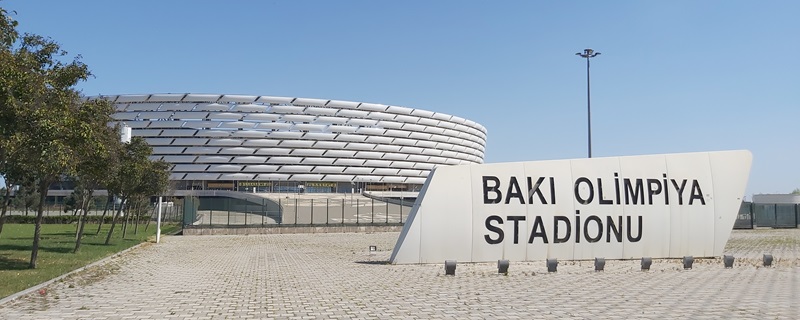The UN climate change body said this week it is giving a larger share of attendance badges for COP29 to non-governmental organisations (NGOs) from developing countries in a bid for more diverse voices at the annual climate summit.
The UNFCCC has tweaked the algorithm used to allocate badges to observer groups this year in response to requests from governments to address a long-standing imbalance in the global representation of participants from civil society, academia and indigenous communities.
Attendees from rich industrialised countries have historically formed the biggest contingent of observers at the COP climate summits. Half of all observers at COP28 in Dubai last year hailed from a bloc of Western European nations, the US, Canada and Australia, even though countries in that group represent only 12% of the world’s population.
UNFCCC Executive Secretary Simon Stiell wrote this week in a foreword to a handbook for observers that “we need the COP process and participation to reflect the fact that the climate crisis is hitting communities in every part of the world”.
Campaigners in the Global South have welcomed the reforms, while some green groups in the Global North quietly expressed surprise and disappointment over hefty cuts to their allocated quotas and the way the changes have been implemented.
Mohamed Adow, director of Nairobi-based think-tank Power Shift Africa, said “finally we are getting a fairer distribution of observer badges”.
“It’s only right that people from countries that are most vulnerable to the climate crisis are able to attend the meetings that are supposed to address their needs,” he added. “For too long, the vast majority of COP badges have been held by people from a small part of the world but with disproportionately high emissions.”
Racquel Moses is the CEO of the Caribbean Climate-Smart Accelerator, which aims to modernise infrastructure through supporting projects like a solar panel assembly facility in Trinidad and Tobago.
She told Climate Home her organisation usually gets three badges but this year received six. “In past years, we had to rely on the generosity of other organisations for support with passes,” she said, “this year at COP, we finally have the ability to be adequately represented”.
Stela Herschmann said that Climate Observatory, the Brazilian think-tank she works for, has “for the first time received a number of credentials close to what we requested”.
She said that “no matter how many badges we requested” in previous years, they only got one or two. But this year, they asked for eight and received seven.
“I believe that this year we will see more Global South involved in the negotiations,” Herschmann said.
Letter of complaint
Some Global North groups, however, have been stunned by the scale of the changes and the impact on access to the climate summit for their staff. Climate Home is aware of several climate organisations with a historically large presence at COPs that have so far received just a handful of COP29 passes or, in more extreme cases, only one badge each.
Joseph Robertson is the head of the US-based Citizens’ Climate International, which trains volunteers to lobby their political representatives. He leads a joint delegation with partner organisations which usually gets about 12 badges, some of which it passes on to campaigners from the Global South. But this year, it got just two badges and so has had to rethink its plans for the summit.
A spokesperson for the UNFCCC told Climate Home that the “Western European and Others Group” was given 40% of the total number of observer badges in the initial allocation for COP29, made in August.
A US-based academic who is a coordinator for the Research and Independent Non-Governmental Organizations (RINGO) constituency – one of the largest groupings of observers – voiced their concerns in a letter sent to Stiell at the end of August and seen by Climate Home.
UN climate chief calls for “exponential changes” to boost investment in Africa
It said that while RINGO appreciates efforts towards achieving “a more diverse and balanced representation” at COPs, the “drastic reduction” in badge allocations for Global North groups “has significant unintended impacts that undermine” that goal.
The letter argued that many groups use their allocations to bring young people to COPs and that organisations headquartered in the Global North provide badges to colleagues based in developing countries.
The letter went on to say that restricting observer quotas could prompt more NGOs to seek attendance passes from government delegations, known as ‘party overflow’. That would put countries “in position of controlling NGO access” and undermine the openness and transparency of negotiations, the RINGO coordinator warned.
The letter calls on the UNFCCC to revisit the quota allocation for COP29 and provide transparency in the process.
UN appeal for “global solidarity”
The UN climate body did not comment on the specific content of the RINGO letter. But a spokesperson told Climate Home “this will continue to be a gradual, iterative and difficult process”, and the UNFCCC secretariat “values any feedback from all stakeholders and will keep looking for ways to improve this process”.
They added that, as some organisations are now applying for an increase in their initial allocation, “the final breakdown of participants by geographic grouping won’t be known for some months”.
In the handbook for observers, published after the RINGO letter had been sent, Stiell pleaded with organisations affected by the changes to support the re-balancing efforts “in a spirit of global solidarity which is so crucial to success, at all levels”.
He also pointed out that the overall number of observer badges had to be cut this year due to a reduction of space at COP29. The summit hosted by Azerbaijan at Baku’s “Olympic Stadium” is expected to be smaller than last year’s gathering in Dubai, which saw a record-breaking 84,000 people attending. A member of Azerbaijan’s COP29 organising committee told Climate Home in April they were expecting around 40,000 people.
The changes to the quota allocation followed an explicit request from countries to the UNFCCC – formulated at June’s mid-year climate negotiations in Bonn – to “continue taking administrative measures to encourage a more diverse representation of observer organizations”.
Update: This article was updated on 9/9/2024 to include Stela Herschmann’s comments and on 10/9/2024 to include Joseph Robertson’s comments and on 11/9/2024 to include Racquel Moses’s comments
(Reporting by Matteo Civillini and Joe Lo; editing by Megan Rowling)

